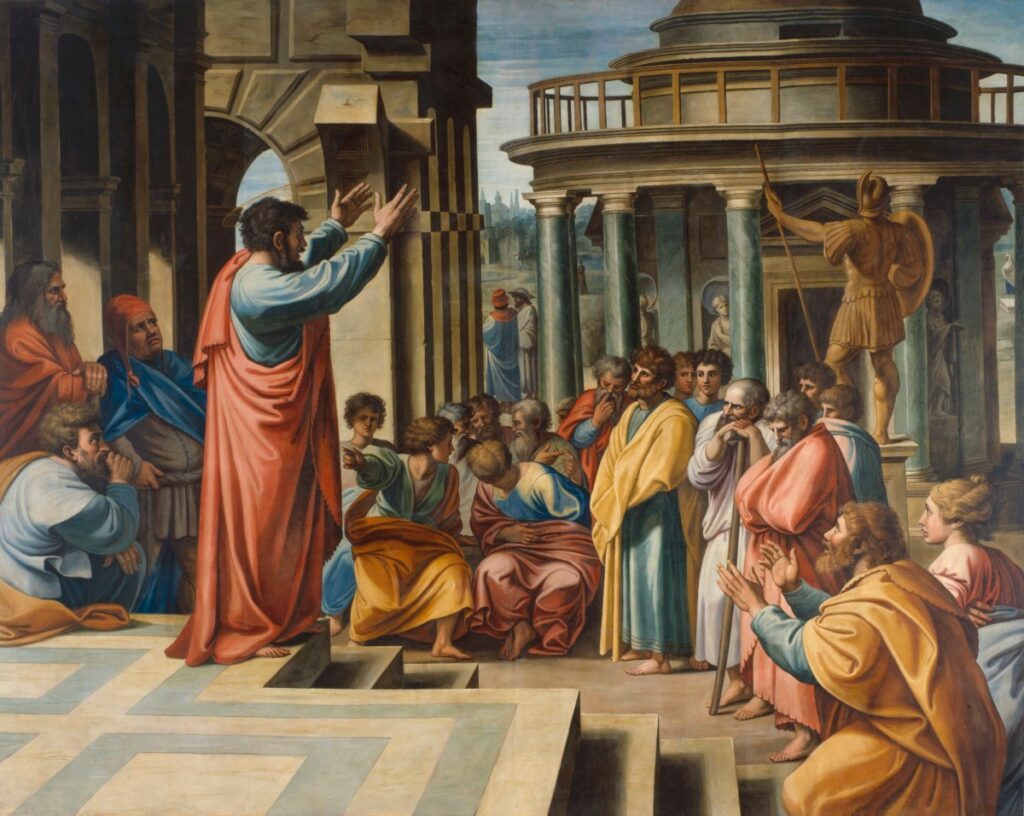Sermon 5/17/2020 “The hope that is in us”
Preacher: Jo J. Belser
Location: Church of the Resurrection “at home” in Alexandria, VA
Text: Acts 17:22-31
Day: 6Easter, Year A, during a pandemic

In today’s first lesson, the apostle Paul shared his faith with some Greek philosophers in Athens who had asked him to explain why he was denouncing the many shrines in their city and their devotion to worship many gods.
Seizing the opportunity to witness to them about Christ Jesus, Paul began with what they believed: that there are gods—deities—who control our destiny, who can change our fate. Then, Paul introduced them to the One True God, the one-and-only God, God the Father, our Creator.
Paul’s sermon was brilliant. Some have noticed that Paul modeled his presentation after the style of Socrates, who much earlier in Athenian history, in 399 BCE, had been on trial in that very same spot in which Paul stood in front of the huge rock outcropping called the Areopagus.
This had been a rather brave thing for Paul to do, given that he had been run out of the last two cities he had visited. And given that Socrates had been executed for failing to persuade those to whom he spoke. But Paul didn’t die THAT day for testifying to both Epicurean and Stoic philosophers who were curious about Paul’s faith.
Let me unpack this for you: Epicureans believed we should revel in material things because, as some say even to this day, “Eat, drink, and be merry, for tomorrow we die.” On the other hand, Stoics believed true life comes when we give up material pleasures of all types: money, power, sex, you name it: abstinence. So, the Epicureans and the Stoics were polar opposites in their world views, like the Republicans and Democrats today. And yet, both groups had assembled to hear what Paul had to say.
In Bible study this week, I said Paul hadn’t succeeded in his sermon. I said that neither the Epicureans nor the Stoics had been convinced: not a single one, at least as far as any scripture or witness from that time tells us. I said, though, the results of our testifying are not up to us, that we just have to do what our second lesson todays instructs, “Always be ready,” this lesson says, “to make your defense to anyone who demands an accounting of the hope that is in [us.]”
Although technically correct, my answer wasn’t complete. An early church tradition says one of the 30 philosophers who heard Paul speak that day—and his wife—became followers of Christ Jesus and the husband became an early Bishop of Athens.
We can’t tell if this legend is historically true. Either way though, only one person in 30 converted seems like a failure using human math, human logic. But God can use one person—or one household, or one church-full of Resurrection people—to do the big things God calls them to do.
But what about the rest of those philosophers who heard Paul’s message and went on their way, seemingly unaffected? They heard the truth but rejected Truth. In some ways this is unfathomable. In my experience, Truth is self-revealing. Truth “outs” itself. Truth cannot be long hidden. Hence the saying that something “has a ring of truth about it.” And yet, the Epicureans went back to partying and price gouging while the Stoics returned to their homes in the ’Burbs and stark judgments.
Today’s gospel lesson has greatly clarified WHY some people don’t perceive and accept the Truth of God. The gospel lesson says they can’t, that only those who know God, those who have found God or been found by God, only those who live in the Spirit of Truth can know Truth when they see Truth because the Spirit of Truth lives within them.
If this logic sounds circular, it certainly is: Only God can reveal God to us, and only the God living in and working through us can allow is to perceive what God has revealed. And then generally only when we choose to participate with God, choose to let God’s Spirit work in our lives in and through us.
Our first lesson today affirms what the whole Church is coming to know in a whole new way: God does not live in shrines or in church buildings. And God is not served by even our acts of benevolence toward others. Our Gospel lesson reveals what God’s work is, what God wants: God wants us to love God and love our neighbors as ourselves.
There was a song entitled “Pass it on” popular among church youth when I was growing up; this song isn’t great music but contains great truth: “It only takes a spark,” the lyrics go, “to get a fire going. And soon all those around, are warmed up in its glowing. That’s how it is with God’s love, once you’ve experienced it. You spread His love to ev’ryone, you want to pass it on.” How will YOU share the hope that is in you this week?

